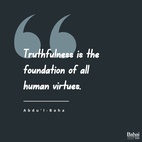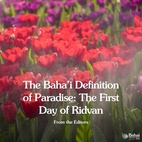The views expressed in our content reflect individual perspectives and do not represent the official views of the Baha'i Faith.
I believe in the message of truth delivered by all the religious teachers of the world. – Gandhi
To be absolutely sure of the truth of matters concerning which there are many opinions is an attribute of God not given to man. – Plato
Ye shall know the truth, and the truth shall make you free. – John 8:13.
The late philosopher of truth Jonathan Dolhenty recognized three methods of determining truth:
The ultimate criterion of truth, as we shall see shortly, is, then, objective evidence, and is based on three possible sources:
The evidence of the senses…
The evidence of the intellect…
The evidence of authority which is reliable testimony. There are strict rules for evidence from authority and there are tests which can be applied to evaluate the reliability of any authoritative source. Much, if not most, of our knowledge comes from the evidence of authority. We accept the findings of trained historians, for example, as well as the findings of empirical scientists.
As Dolhenty suggested, much of our knowledge comes second- or third-hand rather than first-hand. We have no way of independently verifying everything as true, so we rely, every day, on what others tell us. We form pragmatic, evidence-based judgments about truth because most of the world’s truth lies outside the range of our direct experience. Some philosophers call this the “consensus theory” of truth.
 We believe, for example, that the electricity we use daily will continue to safely power our houses—and not burn them down or electrocute us. Believing the truth of that important life-or-death proposition requires us to have faith in the competence, veracity and good will of a whole network of unseen authorities—electricians, building inspectors, wire manufacturers, conduit makers, regulatory agencies, utilities and power suppliers.
We believe, for example, that the electricity we use daily will continue to safely power our houses—and not burn them down or electrocute us. Believing the truth of that important life-or-death proposition requires us to have faith in the competence, veracity and good will of a whole network of unseen authorities—electricians, building inspectors, wire manufacturers, conduit makers, regulatory agencies, utilities and power suppliers.
In spiritual terms, this kind of faith in authoritative evidence generally emerges out of the concept of revelation—the revealing of truth and knowledge from a divine source.
Since the dawn of human history, people have followed the teachings of the prophets who received those revelations. In almost every known culture, those who experienced contact with the divine became prophets and religious teachers, and then taught the population a mystical, religious and moral system of beliefs. Many of those prophets and religions produced sacred scriptures, which become the authoritative basis for widespread Faiths and future civilizations.
Do you have a Faith? If so, you already accept the authority of its teachings, at least to some degree. If you don’t adhere to any religion, you probably have questions or concerns about the truth claims of such authority.
The Baha’i teachings—and this may surprise you, originating as it does from a religious perspective—caution us against reflexively accepting the truth claims of religious authority:
The third criterion is that of tradition, that is, the text of the Sacred Scriptures, when it is said “God said thus in the Torah,” or “God said thus in the Gospel.” This criterion is not perfect either, because the traditions must be understood by the mind. As the mind itself is liable to error, how can it be said that it will attain to perfect truth and nor err in comprehending and inferring the meaning of the traditions? For it is subject to error and cannot lead to certitude. This is the criterion of the leaders of religion. What they comprehend from the text of the Book, however, is that which their minds can understand and not necessarily the truth of the matter; for the mind is like a balance, and the meanings contained in the text are like the objects to be weighed. If the balance is untrue, how can the weight be ascertained? – Abdu’l-Baha, Some Answered Questions, newly revised edition, pp. 344-345.
When we consider the third criterion–traditions–upheld by theologians as the avenue and standard of knowledge, we find this source equally unreliable and unworthy of dependence. For religious traditions are the report and record of understanding and interpretation of the Book. By what means has this understanding, this interpretation been reached? By the analysis of human reason. When we read the Book of God, the faculty of comprehension by which we form conclusions is reason. Reason is mind. If we are not endowed with perfect reason, how can we comprehend the meanings of the Word of God? Therefore, human reason, as already pointed out, is by its very nature finite and faulty in conclusions. It cannot surround the Reality Itself, the Infinite Word. Inasmuch as the source of traditions and interpretations is human reason, and human reason is faulty, how can we depend upon its findings for real knowledge? – Abdu’l-Baha, The Promulgation of Universal Peace, pp. 21-22.
A little shocking, right? You’ve probably never heard of a Faith that warns people about accepting faith-based claims of authority. The Baha’i Faith does, though, repeatedly and with emphasis. In several places in the Baha’i writings, Baha’u’llah and Abdu’l-Baha challenge the mindless, unthinking acceptance of religious authority. In fact, in one of his most important books, Baha’u’llah explicitly charges religious leaders with misusing their authority to hinder humanity:
Leaders of religion, in every age, have hindered their people from attaining the shores of eternal salvation, inasmuch as they held the reins of authority in their mighty grasp. – Baha’u’llah, The Book of Certitude, p. 15.
So—if the truth-determining powers of the senses, of the intellect or of authority and tradition don’t always work, what does? Do we humans have any other sources of discerning the truth?
Please follow along in our series and read tomorrow’s installment, when we consider the fourth and final potential source and criterion of human knowledge and truth: inspiration.

















Comments
Sign in or create an account
Continue with Facebookor